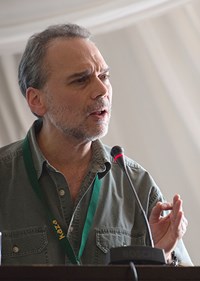Speakers By Topic

Speakers By Type




"{{ovation.quote}}"
-{{ovation.company}}Wildlife Health in a Rapidly Changing World
If we are to successfully address the challenges of saving wildlife in an increasingly human dominated world, we must develop a keen understanding of the relationships among wildlife, domestic animal and human health. There is no question that we need nature, and nature needs us.
Human Health Impacts of Ecological Degradation - Rethinking Public Health in the Anthropocene
Now more than ever, it is becoming increasingly evident that our own health, and that of the global economy, are inextricably linked to our stewardship of the natural world. This recognition serves as a warning, but also as an opportunity, encouraging a meshing of expertise that crosses sectoral boundaries in pursuit of solutions that benefit the health of people, and planet.
Beyond Fences: Tourism, Beef or Both in Southern Africa?
Southern Africa represents one of the last great places on earth for free-ranging wildlife. Animal disease control fences that support the beef export industry are a barrier to wildlife migration paths that these species have depended upon over millennia, with the fences thus contributing to dramatic declines in wildlife numbers in recent decades. A new approach to beef trade that does not depend on fences for disease control might allow the historic migrations to return: a successful outcome for both the livestock and wildlife sectors could be critical for the success of transboundary conservation and the poverty alleviation it is meant to engender.
Steven Osofsky is the Jay Hyman Endowed Professor of Wildlife Health & Health Policy at Cornell University. Prior to that role, he was the Wildlife Conservation Society (WCS)’s Executive Director for Wildlife Health, overseeing all of WCS’s work in the health realm. Previously, Steve served as WWF’s Director, Field Support for species programmes in Asia and Africa. In the early 1990s, he was the first Wildlife Veterinary Officer for the Botswana Department of Wildlife and National Parks. He has also worked in the zoological community and was Director of Animal Health Services at the Fossil Rim Wildlife Center in Texas for several years. As an AAAS Science and Diplomacy Fellow, he served as a Biodiversity Program Specialist at USAID, where he focused on ground-truthing integrated conservation and development projects, providing technical advice on wildlife management, and on working with the US Fish and Wildlife Service on the Rhino–Tiger and African Elephant grants programmes as well as on Convention on International Trade in Endangered Species (CITES) policy.
Steve’s earliest fieldwork was as a Harvard University Travelling Fellow in Africa in the mid-1980s, and it was this experience, observing wildlife species in Kenya, Tanzania, and Rwanda while examining conservation challenges from the perspectives of local people, non-governmental organisations, and governments, that convinced him to pursue a career in wildlife conservation. Steve’s diverse publications include the edited volume Conservation and Development Interventions at the Wildlife/Livestock Interface: Implications for Wildlife, Livestock and Human Health. Osofsky received his undergraduate degree from Harvard University and a Doctorate of Veterinary Medicine from Cornell University, and completed a small animal medical/surgical internship at Virginia Tech. In 2003, he developed the Animal & Human Health for the Environment And Development (AHEAD) Program, one of the foundational components of the WCS One World, One Health initiative. In 2009, he began working with a range of public health and environmental science colleagues to create the Health & Ecosystems: Analysis of Linkages (HEAL) Program, which became a foundation for the launch of the Planetary Health Alliance. He was honored to represent the veterinary profession on The Rockefeller Foundation-Lancet Commission on Planetary Health.